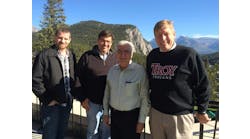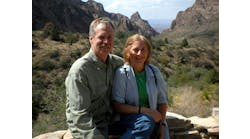When I opened my contract for the fourth edition of the Instrument Engineers Handbook, it had a new paragraph in it. This section was not there in 1966 when I signed to edit the first edition, in 1979 when I signed for the second, nor in 1992, when I signed for editing the third edition of the IEH. This paragraph described what will happen if I die before completing the fourth edition.
"They must have learned about the cattle insert in my displacement pump!" I said to Martha, referring to my recently inserted heart valve replacement. But I was wrong: It is common practice to have such a death clause in your contract if you are 66 and the project involved is of five to six years duration
All the same, this death paragraph made me think. What will happen to the IEH when Im no longer around? Should I not make some preparations for that?
It is for this reason that I decided to ask you to pitch in. It is for this reason that I decided to work on the fourth edition more in the open. I know that making it more of a joint effort will result in a better handbook and--who knows--I might even spot my own future replacement in this process, so that the fifth and sixth editions will be assured.
Ours is a very young profession. When the first edition of the IEH came out, Marks Mechanical Engineers Handbook was in its fifth edition and Perrys Chemical Engineers Handbook was in its sixth. Now, as we are start work on the fourth edition of the IEH, we are in a new millennium. But while our profession is young, we are also unique and special.
After all, no engineering profession can claim what we can. No engineering profession can offer to increase the gross domestic product by $50 billion without building a single new plant, and to do that while increasing safety and reducing pollution. We can do that. We can achieve that goal solely through the optimization of our existing industries. We can increase productivity without using a single pound of additional raw material, without needing a single additional BTU.
The first volume of the IEH deals with Measurement and Analysis, the second is devoted to Process Control, and the third covers Process Software and Digital Networks.This year I am working on the control volume. This volume covers control hardware, including transmitters, controllers, control valves, and displays and provides in-depth coverage of both the theory of control and of how the unit processes of pumping, distillation, chemical reaction, heat transfer, and many others are controlled and optimized.
My main goal is to expand this last area by both increasing the list of unit operations that we cover and, more importantly, by giving much more emphasis to optimization. This is the area where I would like to ask for your assistance. Help me locate the best experts on six continents for each important unit operation in our processing industries. If you have spent a lifetime learning and understanding the unique personality of a process and have figured out how to maximize its efficiency, dont keep that knowledge to yourself; share it with us.
If you or one of your colleagues would like to participate as a co-author, please send me an e-mail and I will send you the table of contents of the control volume. If the topic of your interest is not in the TOC, we can add it; if it is in there, I will consider your offer to update the material that has already been was published in the third edition. I hope that by May or June I will have enough contribution offers to start selecting the best co-authors for each topic.
Once I have picked you as the best potential contributor, I will send you by regular mail detailed instructions on how to prepare your contribution, and I will give you three to four months to complete the manuscript. This way, by late 2004 or early 2005, your unique knowledge will become available to all the readers of the IEH for optimizing processing plants around the world.
I am not looking for people with writing skills, I am looking for engineers with knowledge and experience. I will not reject college professors, although I might delete some of their differential equations and bring them back from the frequency domain back into the time domain. I will consider the contributions of professional consultants if they do not view the IEH as a forum for self-promotion. I will also consider manufacturers if they are able to be balanced and are willing to give credit where credit is due, even if it means crediting their competition.
But my favorite co-author is the plant engineer who is short on words but long on experience. I do not mind answers like: "I dont know if its conductivity or ultrasonics, all I know is that it works." The IEH is written by users and for users; it is not about fancy packaging, it is about content. So dont worry about your writing skills, I can help with that. Please help make the fourth edition of the IEH one we can be proud of. Drop me an e-mail if you want to pitch in.
E-mail Bela at [email protected].



